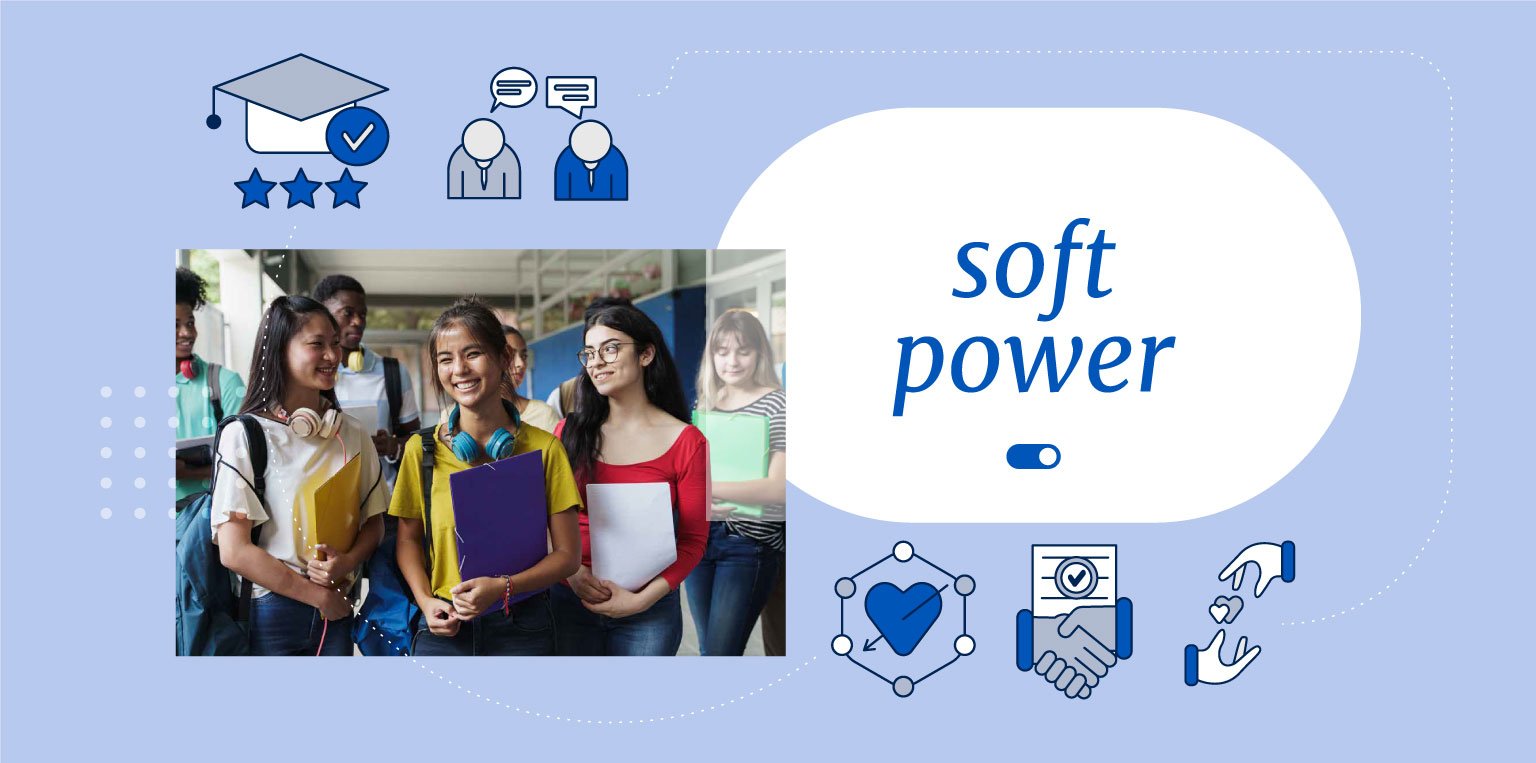The Role of Soft Power in India’s Higher Education Diplomacy Amidst Geopolitical Shifts
Posted by Edunoia on April 24, 2024
In contemporary times, the efforts of Indian institutions like the Indian Institutes of Technology (IITs) and Indian Institutes of Management (IIMs) have been vehemently applauded for their outstanding contributions to both STEM and management education.
The Indian Council for Cultural Relations (ICCR) offers scholarships to students from developing countries to pursue higher education in India.
In the vibrant landscape of India’s higher education, the cultivation of soft power through cultural exchange, academic collaboration, and international outreach has emerged as an essential instrument of global influence.

“Soft power”, a term coined by Joseph Nye, refers to a country’s ability to influence others through attraction and persuasion rather than coercion. It encompasses elements such as culture, education, and values. India’s investment in higher education represents a potent tool in its soft power arsenal.
As the world’s most extensive and thriving democracy, India boasts a robustly independent media and judiciary, which have garnered the nation considerable credibility on the global stage. In recent years, India’s renewed vigour and concentrated efforts in its international interactions have extended to the active deployment of soft power instruments, strategically advancing the country’s broader geopolitical interests.
India’s Higher Education Landscape
Drawing talent and intellectual prowess from across the globe is widely acknowledged as a potent means to augment a nation’s soft power. India, renowned as the “Vishwa Guru” or the world’s teacher, has a rich historical legacy of exerting a profound and far-reaching influence. The illustrious centres of learning, Nalanda and Takshashila, were globally celebrated as beacons of wisdom and enlightenment.
In contemporary times, the efforts of Indian institutions like the Indian Institutes of Technology (IITs) and Indian Institutes of Management (IIMs) have been vehemently applauded for their outstanding contributions to both STEM and management education. These institutions stand as exemplars of India’s educational prowess on the international platform. Bolstering this appeal is India’s thriving academic community, featuring distinguished professors and scholars of global renown. Their collective expertise not only amplifies India’s allure but also underscores the nation’s dedication to fostering excellence in education, thereby fortifying its position as a prominent player on the global educational stage.
In a report published by the Ministry of Education in India, “The total amount of Universities / University like institutions registered is 1,113, Colleges 43,796 and Standalone Institutions 11,296.” This staggering number of educational institutions demonstrates India’s capacity to accommodate a diverse range of international students.
The Ministry of External Affairs under the Government of India has the data of international students arriving in India. The highest number of student visas were issued in the year 2019 (74,689). This substantial influx of international students reflects India’s growing appeal as an educational destination, fostering people-to-people connections and cultural exchange. It not only enriches the academic landscape but also projects a positive image of India worldwide. By welcoming a diverse pool of global talent, India not only strengthens its educational institutions but also enhances its soft power, showcasing its commitment to promoting knowledge, diversity, and international cooperation.

Cultural Diplomacy Through Education
Indian Higher Education institutes play a pivotal role in propagating the country’s culture, traditions, and values. The Indian linguistic and educationist community strongly advocates that the study of Indian languages, philosophy and art empowers international students to gain a deeper understanding of India’s rich heritage. Through education, India can convey its soft power and foster a sense of affinity with the global community.
To promote cultural exchange, institutions often organise cultural festivals, seminars, and workshops that celebrate India’s diversity. These initiatives not only enrich the educational experience of international students but also serve as platforms for intercultural dialogue. By doing so, India is nurturing global citizens who are well-versed in its culture, thereby strengthening its soft power.
Scholarship Programmes and Support
To further endorse its higher education diplomacy efforts, India has initiated various scholarship programmes for international students. The Indian Council for Cultural Relations (ICCR) offers scholarships to students from developing countries to pursue higher education in India. Additionally, the “Study in India” programme aims to attract more international students by providing financial support and easing visa procedures.
Such initiatives demonstrate India’s commitment to making quality education accessible to a diverse global audience, strengthening its soft power in the process.
Role of Brand Consultants
Educational brand consultants play a pivotal role in sculpturing the narrative and strategy of a nation’s higher education diplomacy, particularly in a terrain marked by dynamic geopolitical shifts. These consultants serve as bridge-builders between educational institutions and the global community, facilitating the dissemination of a nation’s soft power assets.
First and foremost, they help institutions refine their branding and messaging to effectively communicate their strengths and unique offerings. Whether it’s highlighting esteemed faculty members, cutting-edge research, or the multicultural campus experience, consultants craft a compelling story that resonates with international audiences.
Furthermore, educational brand consultants actively engage in market research and competitor analysis. They identify emerging trends, pinpoint opportunities, and evaluate the effectiveness of existing strategies. This data-driven approach ensures that a nation’s higher education institutions remain competitive and appealing in the international arena.
Collaboration is another key aspect of their role. Educational brand consultants facilitate partnerships between local and foreign institutions, fostering research collaborations, faculty exchanges and joint programmes. Such alliances not only enhance the global reach of these institutions but also contribute to the soft power narrative.
In the vibrant landscape of India’s higher education, the cultivation of soft power through cultural exchange, academic collaboration, and international outreach has emerged as an essential instrument of global influence. As this influence continues to expand, brand consultants serve as the guiding architects in sculpting India’s educational institutions into beacons of excellence, diversity, and innovation, paving the way for a brighter future.
Sources: (//pib.gov.in/PressReleaseIframePage.aspx?PRID=1894517)
(https://www.immigrationworld.com/india/international-students-in-india-2021-data/)


